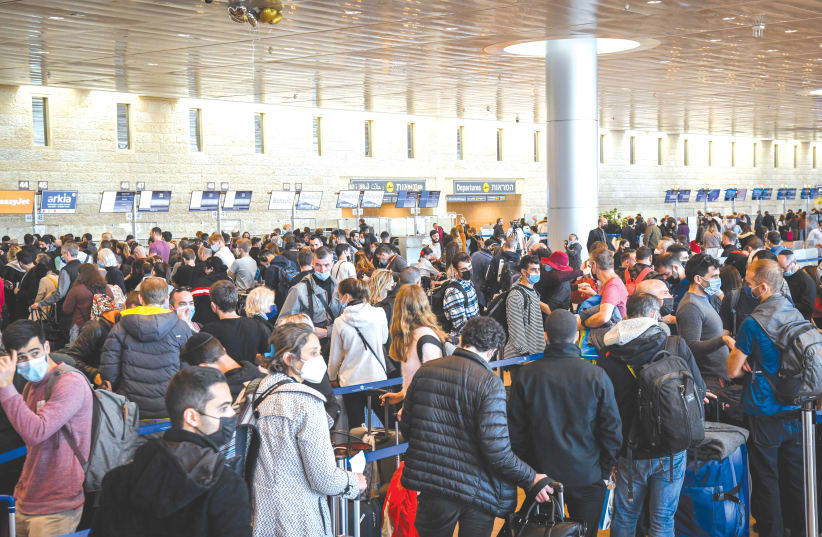Prime Minister Naftali Bennett intends to reinstate travel to Israel as soon as possible, he said Tuesday, without offering any immediate solutions for Diaspora Jewry.
“The topic of Diaspora Jews is very important to me,” Bennett said in a briefing. “It is very close to my heart, and we will do everything to bring things back on track as quickly as possible.”
His remarks came in response to a question about Diaspora Jews frustrated with Israel’s ban on foreigners entering the country due to the Omicron variant of COVID-19.
Several Diaspora Jewish leaders expressed disappointment at Israel’s closed borders in recent weeks.
“The State of Israel has a contract with the Diaspora, wherein Israel is a place of refuge for us, where there is a safety net that exists for all of us,” Conference of Presidents of Major American Organizations CEO William Daroff said. “That contract has been suspended.”
South African Chief Rabbi Warren Goldstein said closing the borders was a “moral disgrace,” and Israel is essentially saying, “You are not part of us; we are not part of you.”
However, Bennett did not offer any solutions to those frustrations or any new policies. The borders are opening gradually, based on the pandemic situation in each country, he said.
Dozens of countries will be removed from Israel’s COVID-19 no-fly list on Wednesday night. But the US, Canada, UK, France and South Africa, which have large Jewish communities, will remain on it.
According to Bennett, the government’s policy since the outbreak of the Omicron strain of COVID-19 was discovered has allowed Israel to keep its market relatively open, without importing too many cases of Omicron from abroad. The slow spread of Omicron, relative to many other countries, bought the government time to come up with a strategy, he said.
Changes in Israel’s COVID-19 quarantine policy were intended to simplify the situation, Bennett said.
The new rule is that when someone who has received three doses of the COVID-19 vaccine comes into contact with someone who has coronavirus, regardless of which strain, he or she only needs to be quarantined until receiving a negative test result. Someone who is not vaccinated must go into isolation for a week.
“If even people who are vaccinated and are exposed [to COVID-19] are put into isolation, it will be a de facto national lockdown with one or two million people in lockdown – and not just once; you could be exposed again,” Bennett said. “Simplification is good and will help the public.”
He called on the public to “live your life, but be a bit more careful to try to protect those who are more vulnerable... I still expect personal responsibility from the citizens.”
The government’s goal is to leave the economy as open as possible, Bennett said.
“A person with a Green Pass” [meaning someone who is fully vaccinated or recently recovered] “is someone who is relatively protected from severe illness, but we take into account that they can be infected,” he said, adding that “vaccines reduce the pace of infection, but they are not hermetic.”
Bennett said he was concerned about mass, crowded New Year’s Eve parties and has instructed the police to crack down and ensure mask policies are enforced and that Green Passes are checked in bars and nightclubs.
The “Novy God” holiday on New Year’s Eve, widely celebrated by immigrants from the former Soviet Union, was less of a concern because it is more likely to be celebrated with family members at home, he said.

